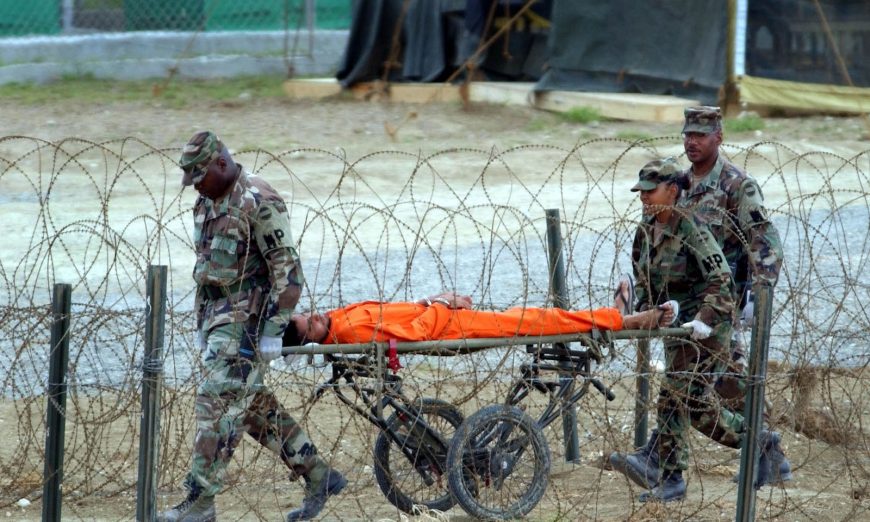However, the Bush administration argued that Guantanamo was foreign soil; therefore, US courts would have “no jurisdiction where the US was not sovereign.” Hence the government concluded that those detainees held in Gitmo could not petition US courts for a writ of habeas corpus.
However, the US Supreme Court proved the government wrong in 2004. In the landmark Supreme Court case Rasul v. Bush, the court ruled that US courts had jurisdiction to consider habeas corpus petitions from Guantanamo detainees. Therefore, the court granted detainees the right to challenge the legality and the factual basis of their detentions in an independent, impartial and competent court.
The administration, on the other hand, endeavored to nullify the Rasul decision. In this respect, the Department of Defense in 2004 announced the formation of the Combatant Status Review Tribunal (CSRT), to provide an “administrative” review of the detentions. In this sense, it lacks independence and is commonly seen as the extension of the executive power established to review the executive detentions. Moreover, the CSRT mechanism has also been criticized for not prohibiting “evidence obtained through coercion or even torture.” However, the government took further action to cripple the age-old principle of the rule of law and habeas corpus.
In 2005 and 2006, Congress passed two enactments, the Detainee Treatment Act (DTA) and the Military Commissions Act (MCA), respectively. The fundamental idea was to establish a substitute for habeas corpus. In this sense, the administration, with the support of Congress, prevented detainees from challenging the lawfulness of their detentions in American courts. In this sense, they reaffirmed and consolidated the prevailing legal limbo in Guantanamo. And so, as Amnesty International asserted, these habeas-stripping acts turned “bad policy into a bad law.”
Nevertheless, the Supreme Court, in the 2008 Boumediene v. Bush case, declared habeas-stripping acts unconstitutional and ruled that detainees in Guantanamo had a constitutional right to challenge their detentions in US courts. The judiciary did what the legislature could not in 2007, when it failed to pass the Habeas Corpus Restoration Act. The court ended the suspension of habeas corpus.
Treatment of detainees
There has also been a growing concern that detainees in Gitmo have been subject to cruel, inhumane or degrading treatment or punishment by the US military and intelligence personnel that sometimes amounted to torture. In this sense, it has been alleged that detainees have been subjected to harsh interrogation techniques, such as water boarding, beating, temperature manipulation, electric shocks, threats with dogs and stress positions, in which detainees are forced into painful physical positions which are maintained for prolonged periods. They include forced standing, awkward sitting or kneeling and suspension of the body from chains or other implements. Moreover, solitary confinement and incommunicado imprisonment of detainees, which causes mental and personality disorders, has received intense criticism from human rights groups. However, these techniques have for the most part been recognized, implicitly or explicitly, by the Bush administration. For instance, in a memorandum issued by President George W. Bush in February 2002, he suggested that there are people “who are not legally entitled” to humane treatment. However, it should be crystal clear that, as a party to the Geneva Conventions and to the Convention against Torture (CAT), the US is obliged by this treaty to treat everyone under its control humanely.
To conclude, the Bush administration has from the very beginning followed policies which aimed to deny Gitmo detainees the basic principles of the rule of law. The underlying rationale was driven by the understanding which saw the relationship between liberty and security as antagonistic rather than complementary. Therefore, liberty and the rule of law had to be restricted in order to gain security. However, what the administration could not see was that those principles are the fundamental pillars of a free society. In 1969, the US Supreme Court said that “the writ of habeas corpus is the fundamental instrument for safeguarding individual freedom against arbitrary and lawless state action.” Moreover, the dictum of Benjamin Franklin should never be forgotten: “They that can give up essential liberty to obtain a little temporary safety deserve neither liberty nor safety.”
In this sense, it is important that President Barack Obama adopts and wishes to promote core constitutional principles such as habeas corpus in Guantanamo. However, there is more progress to be made on this issue.
First and foremost, President Obama needs to execute his decision to close Guantanamo as soon as possible. And detainees currently held in Gitmo should be charged and tried under an independent, impartial and competent court that conforms to international fair trial norms. In the meantime, living conditions in the camp should be improved to conform to international standards. Moreover, harsh interrogation techniques, including water boarding, should be banned. Obama ought to make it clear that cruel, inhumane or degrading treatment or punishment is absolutely impermissible. President Obama should use the support of world public opinion, which has strong belief in his capacity to bring change, and do the right things not only for his but also for America’s credibility in the eyes of the world.
Last but not least, it should not be forgotten that the adoption of the rule of law and respect for the most fundamental human rights, even in times of war, do not make America less safe, but stronger and more credible.
*Ömer Zarplı is a student at the department of international relations at the Middle East Technical University (ODTÜ) and an intern at the Human Rights Agenda Association.

